
Alfred Elton van Vogt was a Canadian-born science fiction author. His fragmented, bizarre narrative style influenced later science fiction writers, notably Philip K. Dick. He is one of the most popular and influential practitioners of science fiction in the mid-twentieth century, the genre's so-called Golden Age, and one of the most complex.
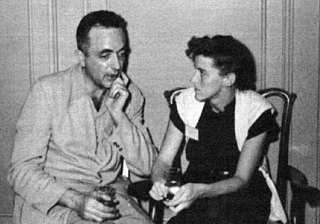
Katherine Anne MacLean was an American science fiction author best known for her short fiction of the 1950s which examined the impact of technological advances on individuals and society.
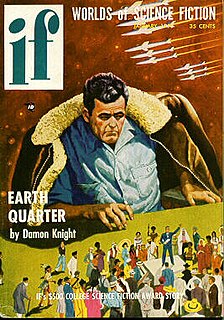
Damon Francis Knight was an American science fiction author, editor and critic. He is the author of "To Serve Man", a 1950 short story adapted for The Twilight Zone. He was married to fellow writer Kate Wilhelm.

On the Beach is a 1957 post-apocalyptic novel written by British author Nevil Shute after he emigrated to Australia. The novel details the experiences of a mixed group of people in Melbourne as they await the arrival of deadly radiation spreading towards them from the Northern Hemisphere, following a nuclear war a year previously. As the radiation approaches, each person deals with impending death differently.
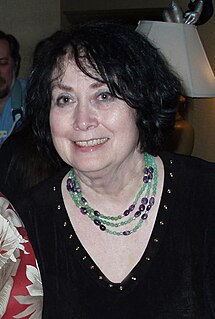
Carolyn Janice Cherry, better known by the pen name C. J. Cherryh, is an American writer of speculative fiction. She has written more than 80 books since the mid-1970s, including the Hugo Award-winning novels Downbelow Station (1981) and Cyteen (1988), both set in her Alliance-Union universe. She is known for "world building", depicting fictional realms with great realism supported by vast research in history, language, psychology, and archeology.

Kate Wilhelm was an American author. She wrote novels and stories in the science fiction, mystery, and suspense genres, including the Hugo Award–winning Where Late the Sweet Birds Sang, and she established the Clarion Workshop with her husband Damon Knight and writer Robin Scott Wilson.

The World of Null-A, sometimes written The World of Ā, is a 1948 science fiction novel by Canadian American writer A. E. van Vogt. It was originally published as a three-part serial in 1945 in Astounding Stories. It incorporates concepts from the General Semantics of Alfred Korzybski. The name Ā refers to non-Aristotelian logic.
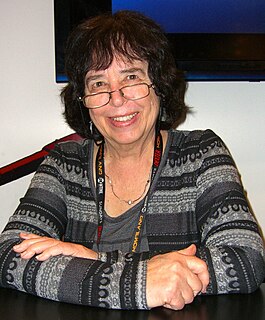
Jane Hyatt Yolen is an American writer of fantasy, science fiction, and children's books. She is the author or editor of more than 350 books, of which the best known is The Devil's Arithmetic, a Holocaust novella. Her other works include the Nebula Award-winning short story Sister Emily's Lightship, the novelette Lost Girls, Owl Moon, The Emperor and the Kite, the Commander Toad series and How Do Dinosaurs Say Goodnight. She has collaborated on works with all three of her children, most extensively with Adam Stemple.

The Skylark of Space is a science fiction novel by American writer Edward E. "Doc" Smith, written between 1915 and 1921 while Smith was working on his doctorate. Though the original idea for the novel was Smith's, he co-wrote the first part of the novel with Lee Hawkins Garby, the wife of his college classmate and later neighbor Carl Garby. The novel starts as an edisonade, but turns into a space travel adventure when the characters go into deep space. The Skylark of Space is considered to be one of the earliest novels of interstellar travel and the first example of space opera. Originally serialized in 1928 in the magazine Amazing Stories, it was first published in book form in 1946 by the Buffalo Book Co. The novel was followed by three sequels, beginning with Skylark Three.

A Case of Conscience is a science fiction novel by American writer James Blish, first published in 1958. It is the story of a Jesuit who investigates an alien race that has no religion yet has a perfect, innate sense of morality, a situation which conflicts with Catholic teaching. The story was originally published as a novella in 1953, and later extended to novel-length, of which the first part is the original novella. The novel is the first part of Blish's thematic After Such Knowledge trilogy: it thus follows Doctor Mirabilis and both Black Easter and The Day After Judgment.

More Than Human is a 1953 science fiction novel by American writer Theodore Sturgeon. It is a revision and expansion of his previously published novella Baby is Three, which is bracketed by two additional parts written for the novel . It won the 1954 International Fantasy Award, which was also given to works in science fiction. It was additionally nominated in 2004 for a "Retro Hugo" award for the year 1954. Science fiction critic and editor David Pringle included it in his book Science Fiction: The 100 Best Novels.

Sorcerer's Son is the first novel in "The Book of Elementals" series by Phyllis Eisenstein, first published as a mass-market paperback in 1979 by Del Rey Books..

Emergence is a science fiction novel by American writer David R. Palmer. It first appeared as a novella published in Analog Science Fiction in 1981; the same magazine also published Part II, "Seeking", in 1983. The completed novel then was published by Bantam in 1984. The plot follows a precocious 11-year-old orphan girl, living in a post-apocalyptic United States. It had three printings through July 1985, and was republished in 1990 as a "Signature Special Edition" with a few minor edits and a new afterword by the author.

Moira Crone is an American fiction author. She was born and raised in Goldsboro, in the tobacco country in eastern North Carolina. She is the author of three collections of short fiction and two novels. Her short stories have been classified as "Southern Gnostic", and as exemplifying the spirit of the New South. Her work has been compared to Flannery O'Connor's for its spiritual overtones and to Sherwood Anderson's for its depiction of small town life and characters. She taught fiction writing at Louisiana State University, where she served for a number of years as Director of the MFA Program in Creative Writing and is now Professor Emerita. She also worked as fiction editor for the University Press of Mississippi. Her works have been chosen for the "Year's Best" by the award anthology New Stories From The South five times. In 2009, she was awarded the Robert Penn Warren Award in Fiction from the Fellowship of Southern Writers in recognition of her body of work. In the citation, Allan Gurganus wrote, "Moira Crone is a fable maker with a musical ear, a plenitude of nerve, and epic heart." Moira Crone lives in New Orleans. She is married to poet and author Rodger Kamenetz and has two daughters, author Anya Kamenetz and Kezia Kamenetz.

The Long Tomorrow is a science fiction novel by American writer Leigh Brackett, originally published by Doubleday & Company, Inc in 1955. Set in the aftermath of a nuclear war, it portrays a world where scientific knowledge is feared and restricted. It was nominated to the Hugo Award.

The Man Whose Teeth Were All Exactly Alike is a realist, non-science fiction novel by American writer Philip K. Dick. Originally completed in 1960, this book was initially rejected by potential publishers, and posthumously published by a small press in 1984, two years after Dick's death.

Empire of the Atom is a science fiction novel by Canadian American writer A. E. van Vogt. It was first published in 1957 by Shasta Publishers in an edition of 2,000 copies. The novel is a fix-up of the first five of van Vogt's Gods stories which originally appeared in the magazine Astounding. The remaining Gods stories are collected in The Wizard of Linn. Author and critic James Blish observed that the plot of the Gods stories resembled that of Robert Graves' Claudius novels. Author and critic Damon Knight said that the plot was "lifted almost bodily" from the plot of I, Claudius. A genealogy chart of the ruling family of the Empire of Linn is included.
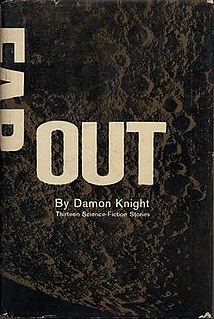
Far Out is a collection of 13 science fiction short stories by American writer Damon Knight. The stories were originally published between 1949 and 1960 in Galaxy Magazine, If Science Fiction and other science fiction magazines. There is an introduction by Anthony Boucher.

Conjure Wife (1943) is a supernatural horror novel by American writer Fritz Leiber. Its premise is that witchcraft flourishes as an open secret among women. The story is told from the point of view of a small-town college professor who discovers that his wife is a witch.

A for Anything is a science fiction novel by American writer Damon Knight. The author postulates the discovery, in the near future, of the "Gismo", a device that can duplicate anything—even another Gismo. Since all material objects have become essentially free, the only commodity of value is human labor, and the author suggests that a slave economy would be the inevitable result.




















